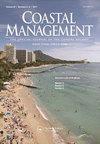How Have the U.S. Coasts Changed (and How Are They Going to Change) as Cultural and Policy Spaces? An Example from California
IF 1.9
4区 环境科学与生态学
Q4 ENVIRONMENTAL SCIENCES
引用次数: 3
Abstract
Abstract Over the centuries, the coastal zones of the world have attracted agents of political expansion and instrumental maritime (e.g., fishing, shipping, boat building) industries seeking profit, and also great numbers of the general public seeking a place for residence, relaxation, outdoor recreation, tourism and other forms of play. The impressive amenities of the coastal zone are the economic value of natural resources and the social value of a sublime biophysical and human ecology. In the United States, the Coastal Zone Management Act of 1972 created a mandate for special area management plans to balance protection of the coasts with provisions that allow residence, visitation, and industry. This mandate is also found in the California Coastal Act of 1974 which created the California Coastal Commission. In the time since the passage of these acts, the cultural and policy spaces of California’s coast have changed dramatically. It is, however, an open question as to whether the Coastal Commission—and the many governmental entities with which it interacts—have succeeded or failed in their mandates. Whatever the conclusion drawn, this speculative essay suggests that climate change-induced future sea level rise will render the historic coastal management institutions and approaches obsolete. The future will be very different—ecologically, culturally, economically and politically. Coastal zone practitioners will be forced to reconfigure and expand their mandates and toolkit. We encourage a recognition that the challenge before them will be a new and very different one. It will call for an adaptation of the coastal management profession and the reorientation of the training and education of the next generation of coastal leaders in the public, private and civil society sectors. This should entail an expansion of disciplinary expertise to address human dimensions topics that include planned retreat, population and infrastructure relocation, social equity and environmental justice and be intimately informed by science and stakeholder engagement.作为文化和政策空间,美国海岸是如何变化的(以及它们将如何变化)?加州的一个例子
几个世纪以来,世界沿海地区吸引了寻求利润的政治扩张和海上工具(如渔业、航运、造船)行业的代理人,也吸引了大量寻求居住、放松、户外娱乐、旅游和其他形式游戏的普通公众。沿海地区令人印象深刻的便利设施是自然资源的经济价值和崇高的生物物理和人文生态的社会价值。在美国,1972年的《沿海地区管理法》(Coastal Zone Management Act)制定了一项特别区域管理计划,以平衡对海岸的保护与允许居住、旅游和工业的规定。1974年的《加州海岸法》中也有这一规定,该法案成立了加州海岸委员会。自这些法案通过以来,加州海岸的文化和政策空间发生了巨大变化。然而,海岸委员会——以及与之互动的许多政府实体——是否成功或失败完成了他们的任务,这是一个悬而未决的问题。无论得出什么结论,这篇推测性的文章表明,气候变化引起的未来海平面上升将使历史上的沿海管理机构和方法过时。在生态、文化、经济和政治方面,未来将是非常不同的。沿海地区的从业者将被迫重新配置和扩展他们的任务和工具。我们鼓励认识到,摆在他们面前的挑战将是一个新的和非常不同的挑战。它将要求调整沿海管理专业,并重新调整公共、私营和民间社会部门下一代沿海领导人的培训和教育方向。这需要扩大学科专业知识,以解决包括计划撤退、人口和基础设施搬迁、社会公平和环境正义在内的人的维度问题,并密切关注科学和利益相关者的参与。
本文章由计算机程序翻译,如有差异,请以英文原文为准。
求助全文
约1分钟内获得全文
求助全文
来源期刊

Coastal Management
环境科学-环境科学
CiteScore
6.00
自引率
0.00%
发文量
24
审稿时长
>36 weeks
期刊介绍:
Coastal Management is an international peer-reviewed, applied research journal dedicated to exploring the technical, applied ecological, legal, political, social, and policy issues relating to the use of coastal and ocean resources and environments on a global scale. The journal presents timely information on management tools and techniques as well as recent findings from research and analysis that bear directly on management and policy. Findings must be grounded in the current peer reviewed literature and relevant studies. Articles must contain a clear and relevant management component. Preference is given to studies of interest to an international readership, but case studies are accepted if conclusions are derived from acceptable evaluative methods, reference to comparable cases, and related to peer reviewed studies.
 求助内容:
求助内容: 应助结果提醒方式:
应助结果提醒方式:


